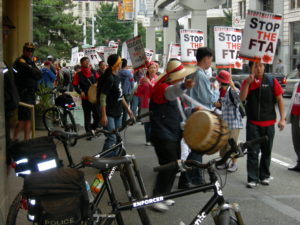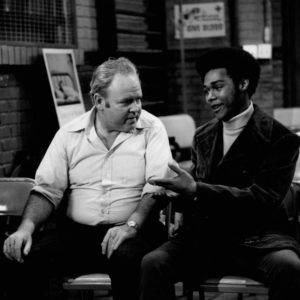SLOW GROWTH AND POPULIST PUSHBACK: The Times They are a ‘Changing
By The Economic Development Curmudgeon
THE CHALLENGE FOR STATE AND LOCAL ECONOMIC DEVELOPMENT
The old programs/strategies/theories/models aren’t working. A new paradigm is in the making. Those who embrace the contemporary paradigm push back hard and urge us not to succumb to the “isolationist temptation” to gate your community from a global economy,[i] Free trade, “aka comparative advantage” must be allowed if we are to grow economically, produce more jobs, and enjoy true prosperity. There is no other path than free trade and national comparative advantage. Perhaps.
This article does not question free trade/comparative advantage per se—but it does assert that free trade, as implemented thus far, has its drawbacks—and those drawbacks have profound consequences and opportunities for state and local economic developers. In particular, this article suggests free trade has deeply hurt “the Forgotten People” (working and lower classes) and that across the globe, these Forgotten People are restive and voting—it’s called populism in polite society—fascism in many newspapers and magazines. Economic developers can play a serious role in adjusting free trade to reduce the harm it inflicts on the “Forgotten People”.
The road map for this article is it first outlines the link between populism and slow economic growth. Secondly, a short discussion follows on why various ideologies assert slow/no growth has dominated our economies and will continue unless corrected by adopting the “cure” each proposes. Hidden-in-plain-sight is the major ideologies accept and incorporate free trade into their perspective. Free trade has truly become the accepted paradigm of global finance and trade whatever one’s ideological stance. Look for no real help for those hurt by free trade from these paradigmatic policy and ideological elites.
The third discussion introduces this article’s conceptual observation that free trade, like it or not, is characterized by a “lag and shift” (defined below) dynamic that among other things has made the lives of “Forgotten People” a horrendous and demoralizing struggle offering little hope of salvation–hence the rise of a hostile populism–and has rendered conventional economic development strategies and programs grossly ineffective. Next, the article outlines an economic development response to populism and but also specifies the class/culture distinctions that create a serious gap between “Forgotten People’ and conventional economic development strategies and practice.
Finally, how economic development can better close that gap and offer the benefits of jobs, training, and place-based redevelopment to improve the lot of the “Forgotten People” is presented. Then we send the reader off on his or her merry way–with the caveat “the times they are a-changing“.
Slow Growth and Populism
The US economy is virtually the only major economy in the world still growing—albeit at very low rates. In an historically low-interest rate environment this is bad news. The Financial Times/Brookings Tiger Index (tracks global economic recovery) recently proclaimed the global economy is “sliding back into the morass … reinforcing fears that many countries have been caught in a vicious circle of low growth, popular discontent and a backlash against trade … resulting against in more economic weakness”[ii]. Unemployment, lowest in years, cannot offer hope as a solution. Indeed, the Census Bureau recently released data[iii] demonstrating income has increased and poverty lessened. The economic policy pedal to the metal has been pressed for many years. It has largely done what it was supposed to do. One wonders if it can be maintained much longer.
If the Federal Reserve raises interest rates—as it soon must– that increases cost of debt service (deficits increase), and our currency (the dollar) exchange rates rise and hurt exports and emerging market economies–limiting their ability to import our goods/services. This inhibits increased business investment. So there is no clear path, or a magic bullet solution, for our slow and very fragile economic growth. No matter who wins the election, they will confront frustration with slow growth or even recession, both of which strengthen “populist” left and right. Bluntly, as Martin Wolf, Financial Times economics columnist put it, it’s time to “end facile optimism about the future”[iv].
A recent Financial Times article by Mohamed El-Erian, former Harvard University Foundation/IMF/PIMCO, now Allianz CIO, and author of “The New Normal” asserts the least likely future economic scenario is continuation of current slow growth witnessed over the last eight years. Companies are more cautious, consumer spending has topped and will weaken, and the stock market is range-bound and strained. “Such disappointing economics acts as a fuel for political polarization and dysfunction. It feeds mistrust about ‘expert opinion’ … accentuates suspicion of the ruling elites and the establishment … the longer the economic weakness endures, the greater the influence of anger politics”.
One thing is clear he asserts: “The ‘new normal’ is coming to an end … it has lasted for so long that it is now breeding the causes of its own destruction” [v].
In a 2011 book, the Globalisation Paradox, Dr. Dani Rodrik (Kennedy School of Government) called attention to a “fundamental political trilemma of today’s world: we cannot simultaneously pursue democracy, national determination [including protectionism] and economic globalization [i.e. free trade/comparative advantage]”. He argues free trade and trade agreements inspire intensified negative backlash, volatile politics, and perceived negative effects. For many the new global economy lacks legitimacy compared to the national economic systems most are used to.
In a later article, Rodrik suggests the domestic “social contract” among classes has become undone–that “hyper-globalisation … make it more likely that nativist politicians will gain ground. … frustrations of the middle and lower classes are rooted in the perception that political elites have placed the priorities of the global economy ahead of domestic needs“.[vi]
What Went Wrong?
Up to now studies/policy prescriptions by authors from prestigious institutes, universities, and think tanks (heretofore promoters of, and beneficiaries from, comparative advantage and free trade) dominated policy-maker’s attention. All endorsed free trade; each offered its idea on the cause of slow/no growth which has become painfully obviously since the Great Recession. In recent months, however, the free trade paradigm has been challenged, at least to the extent that ill effects are acknowledged, the link between slow growth and populism incorporated, and critical factors identified. Importantly, various schools of thought (ideologies) offer prescriptions and often challenge the propositions of other schools of thought. A debate has developed which could be fundamental to global trade and finance. This debate, I assert, is fundamental to the strategies and practice of American state/local economic development.
First from the left. The Financial Times noted “Populists are picking the wrong culprits. Globalization may be the focus of people’s anger, but unequal growth in wealth and income maybe as much about the effects of taxation policy, or the distortions of recent monetary policy, or policymakers’ failure to sustain gains in productivity … Policymakers … need to tackle inequality and make capitalism more inclusive”[vii]. In short, the populists are wrong; they need to understand the core problem is capitalism itself, which needs to be more inclusive and the policy response should be redistributive to counter inequality—the prime cause of stagnation. The left’s critical defense of inequality as the chief cause of global stagnation has been based on “the elephant chart” which “proves”, more precisely asserts, the correlation between the two are closely linked.
This view, and the elephant chart validity, however, has been recently challenged by former World Bank economist Branko Milanovic and the prestigious Resolution Foundation (which advocates for the lower middle class) [1]. Milanovic recent analysis rejects the “elephant chart” that asserts “inequality” is responsible for wage stagnation, rising incomes for super-rich, and low economic growth. What makes this Milanovic’s report so powerful is that Milanovic is the author of the “elephant chart”. He now believes the data proves the super-rich have been disproportionately hurt by the Great Recession and that inequality has markedly narrowed in recent years. For Milanovic the cause of the developed world’s post-Great Recession’s slow growth has been the rise of China and her middle class[viii]. The role of China and the Trump vote seems to be supported by a Wall Street Journal analysis entitled “Deep, Swift China Shock Drove Trump’s Support”[ix]
The liberal (Keynesian) establishment, on the other hand, (for example Lawrence Summers) call for stimulus and infrastructure “which can create quality jobs and provide economic stimulus without posing the risk of easy-money policies … They also see such investment can expand the economy’s capacity … and mitigate the huge maintenance burden we would otherwise pass on to the next generation”[x]. Infrastructure is in their view the most effective way to compete in a free trade environment. This reliance on infrastructure, however, ignores caveats of Glaeser[xi] who argues the traditional focus on transportation-related infrastructure didn’t work in 2010, and are not likely to work in the next round. Infrastructure also generates huge additional debt that, if the strategy is successful–prompting future interest rate increases–will be exceedingly expensive to service.
In a later article Summers expresses concern that America’s fragile slow growth is close to “stall speed” and that “After seven years of economic over-optimism there is a growing awareness that challenges are not so much a legacy of the financial crisis as of deep structural changes in the global economy … [and that] it can hardly come as a great surprise that when economic growth falls short year after year, and when its beneficiaries are a small subset of the population electorates turn surly”. To address slow growth and surly electorates, he again stresses infrastructure, spurring demand and business investment and reform of the “dark side of capital mobility” such as money laundering, regulatory arbitrage (by this I think he would include what economic developers call state business climate), and tax reform (removing sector loopholes). [xii]. If Summer and Liberals get their way, economic developers will stand in line for infrastructure, demand/business investment and “shovel-ready” grants for their projects. More emphasis will be placed on knowledge-based economics and on the unqualified belief that such innovation (and productivity) will inevitably create more and better jobs than they destroy. This is, in effect, the status quo.
The traditional conservative establishment emphasize corporate tax reform, business investment, less regulation, infrastructure, and augmented business formation. “Washington and state governments need to wake up and remove obstacles to investment, new business formation, and labor mobility. Encouraging investment in human capital and productive infrastructure is essential, and so is moving to financial and interest rate conditions that promote investment and growth.”[xiii]. Critics observe much of this is a derivative of the usual neo-liberal, austerity that funnels scarce funds to business away from those who truly need it. Its success is dependent on victory by Republicans in the November election. Good luck with that. In any case, the conservative establishment endorses free trade, and the major exception, the pre-Trump Tea Party, which since Trump has disappeared from public discussion.
Whichever of the above approaches win out. it is likely state and local economic development will continue to target sunrise industries and let sunset industries go their way into the cruel night—with the appropriate program platitudes of skills retraining, job counseling/relocation and need for higher education–which seemingly have not been a screaming success given the intensity and widespread populism that presently characterize our politics. Lost, perhaps predictably, in this interchange are the “Forgotten People” who are displaced by free trade’s sector shifts, innovation, the knowledge-based economy, and productivity. [xiv] [xv]. The current fate that currently befalls taxi drivers, truckers, and coal miners will continue; they will be sacrificed on the altar of innovation, productivity and disruption. Nothing will change. This is the key issue the remainder of the article addresses. Presently, many current economic development strategies compound the plight of the “Forgotten People” by focusing economic development on sunrise sectors and compelling those displaced to find jobs in those sectors. That plight results from what I call free trade’s inherent “lag and shift” syndrome–the subject of the next section.
My Two Cents: Lag and Shift Syndrome (L&S)
The central assumption of free trade/comparative advantage is free trade creates more jobs than it displaces. I am not sure where this assumption comes from, on what data it is based upon—but I am sure the readers will supply me with the correct information. In the meantime, this article presents the “lag and shift” syndrome (L&S) which I argue is inherent in a free trade global environment. Lag and shift does not fundamentally question or reject free trade or comparative advantage. It does assert that free trade does not work like a light switch—there are shifts and lags that create the Forgottens, and to address their plight L&S should be acknowledged and incorporated into state and local economic development.
L&S posits that free trade shifts jobs (and capital) from sunset sectors/industry to sunrise sectors. Those displaced from sunset sectors are not necessarily the workers hired in the growth sunrise sectors. They are, in fact, likely to be different populations in different locations, and often different generations.
Those who obtain jobs in growth sectors do so over a number of “future” years while those who are displaced from “losing” sectors lose employment in the near term. For the most part they do not get hired in growth sectors in the short term—or even the intermediate and longer terms. This is the lag effect. It is more likely those who benefit from free trade are members of an entirely different generation open to new skills, more mobile and willing to relocate, and hold different cultural values/skills that can facilitate employment in new sectors. This is the “shift effect”, with different populations suffering the consequences of free trade and those benefiting from it.
Free Trade may ultimately create more jobs than those lost, but free trade usually leaves behind populations that never recover lost prosperity or individual identity. Contemporary economic and community development has failed these people, pushed them aside, and has for the greater part put its eggs in the basket of the sunrise sectors and workers.
L&S is not explicitly denied by the contemporary free trade/comparative advantage paradigm. Indeed, it is commonly accepted—but swept under the rug. Population mobility and workforce/ displaced worker retraining or even entrepreneurism has been applied to counter L&S. This article asserts, however, that none of these solutions—or any other used thus far—has meaningfully countered L&S. There are individuals who benefit from such programs and strategies, of course, but history over the last fifty years provides ample evidence that the volume of successful program outcomes has not produced a critical mass sufficient to address the population adversely affected by free trade/comparative advantage. That is a problem and an opportunity for state and local ED leadership.
Displaced workers, by definition, have already entered the workforce and acquired some level of training in an occupation and industry sector. They have established a residence, and whatever their age have made a commitment to a geography. Their decisions often are heavily influenced by personal interests and preferences—and the culture imparted by his/her socialization. For their own reasons many are not willing, some are not able to shift occupations, relocate, or learn new unwelcome skills for jobs they cannot see in the community in which they reside and want to live. Many did not do well in school, and have little interest in returning to one. L&S creates a situation that dooms much of our current displaced worker/entrepreneur strategies and their failure sustains and fosters the lack of hope that creates populism’s rage.
Moreover, L&S not only has a time and demographic effect, it has a “place” effect. There is no compelling reason to believe “the where” of decline and growth must be in the same geography. L&S play are large role in our chronically declining cities and neighborhoods. .
Displaced workers and those who perceive themselves as potentially displaced are the core of the “Forgotten People”. They usually belong to older age cohorts, reared in past socialization patterns and are often not of the same social economic class of those who (later) acquire jobs through knowledge, innovation, and sophisticated productivity enhancements. They do not inevitably and necessarily aspire to current conventional upper middle-class goals and lifestyles–or even the goals and motivations assumed as integral to our traditional economic development strategies. Most prefer homogeneity over diversity–i.e. although most are well-meaning and surprisingly tolerant, they are not politically correct.
Their old jobs provided an identity and security which is now gone; many lack resilience and fear risk-taking –and these attributes cannot be taught. Most are adults with families in the middle years of their life. The likelihood is that those displaced more often are committed not only by a chosen occupation, residence, and family, but by the values and preferences imparted by their cultural socialization and role models as well. A major reason why traditional workforce and knowledge-based economic program prescriptions have not worked sufficiently well is that they do not take into account, or depreciate, the effects of culture and the attitudes and predispositions of their clientele.
The plight of these “Forgotten People” is made worse by the reality of economic decline expressed in the slow growth of the American economy over the last decade—and the profound weakness of the global economy. The recent trigger of extreme populations migration/immigration in America and Europe have seemingly intensified the woes, fears, and unarticulated concerns of the Forgotten People and –thank the lord (sarcasm)—the media played them up/distorted them “ideologicalized” them– obscuring a core problem. At root populism is class conflict which runs counter to our present-day identity politics focused on race, rights, empowerment and criminal justice.
The inability of policy elites [and many economic developers] to bridge the gap–and transcend the different politics between identity and populist politics–between elite/policy-maker’s culture, attitudes and values and those of the working and lower middle classes who are predominately displaced, has become a critical issue in state and local economic development.
Economic Development: a “bridge over troubled cultures”
It is not likely anyone will ask the Forgotten People what they want. Therein lies the root of the issue. The displaced worker, the Forgotten are, in effect, intellectually and institutionally disenfranchised from participating in this policy dialogue. Lacking the background, skills and articulateness associated with policy analysis and program design, often skeptical of the process, and fatalistic regarding its eventual outcome, they lack for faithful and competent advocates to press their case. Until the “Forgotten People” develop their own leadership, not rich inarticulate narcissistic billionaires, they will be manipulated by the establishment. They will have labels nailed onto their heads and through their tongues by others who will use them to press for their own hobby-horses, policy agendas, and self-interests.
State and local economic developers, however, look these people in the face when they shop,and take their kids to school, the mall, and football/basketball/hockey games. They are your neighbors; probably your relatives. They are a vital element of the community you serve. It is through us that the hopes and frustrations of the Forgotten can be addressed.
On the face of it, what the Forgotten People need are jobs[xvi], and for that they must garner education and skills. No problem. That is clearly state and local economic development-related and we have the strategies and tools to work with this problem: workforce, job-training programs, incentives, attraction, retention, and at the state-level (and large city-metro) business climate and cluster development. The problem is, however, obvious—this stuff has been around forever, along with this “university-and data driven economic development”. Despite this “stuff”, there they are—the Forgotten People—it hasn’t dented their rage, and more important it has not cured their ills.
We haven’t included them in the strategy debate, the program design, or the policy discussion. There are good reasons for this: they yell at you, they are bitter and fatalistic, they call for obviously “wrong” actions and initiatives, and like Trump they don’t adhere to politically correct verbiage and attitudes. They just don’t look at things the same way we do!
Welcome to the working class and their lower middle class compatriots.
To enter into the world of the Forgotten People economic developers need to cross class lines. We should, I think, resist telling them they do not know what they want—that they do not understand their own correct interests. The fact of the matter is they do. They do not want the same things the middle and upper classes want—at least not in the same priority order. This is the cultural divide that separates economic development, even community development, from the Forgotten People. The divide is cultural—not economic. They do not fit into the economic models. They are not wrong. They do not need to be converted—their kids will do whatever conversion occurs—maybe.
They do not prefer, for the most part, redistributive programs. They want jobs and careers as they define them—they do not want to work for the gazelles; they consciously do not want to be rocket scientists and computer programmers. They want what they know and feel comfortable with what they are doing. They want to be themselves. They don’t want to be engineered into entrepreneurs. They are, for the most part, not risk-takers. Frankly, they identify with Archie Bunker, or if you will, with “Big Head”, not Richard Hendriks on Silicon Valley. They do not aspire to write compression algorithms.
They value order, homogeneity and families, however broken and dysfunctional they may appear. They value their communities, home/house, and neighborhoods—they do not want to move. They are the reason we build sports stadiums. They don’t retire to Florida or Arizona. Their kids may move—but they don’t. They are “locked into a place”. So they stay in place.
Conclusion
By now the reader gets my drift—to work economic development for the Forgottens we might consider that we have to open ourselves to other ways of thinking, and develop a new tool kit—or maybe bring back an older one.
To make economic and community development work with the Forgotten People we ought to see what jobs they define as appropriate. What should be clear is that those jobs and occupations, frequently defined as growing (hence “good” jobs) by conventional economic development are not attractive, perhaps not attainable, by the Forgotten People. Amazingly, this article hints that maybe economic development should also create “bad jobs” to provide opportunity to the “Forgotten People”. Forgotten People do not have “politically correct” career goals and aspirations. Rather jobs in housing, the helping occupations, vocational jobs like electrician and plumbing—and truck drivers and taxi cab drivers are more compatible with culture and working class risk-taking. These jobs are compatible with working class/lower middle class culture, and are, of course, the jobs our innovation, knowledge-based, artificial intelligence/ software, and productivity enhancements destroy. We need to square that circle.
In short, to deal with the Forgotten People, economic developers might unlearn much of what they have been taught. Innovation and knowledge-based ED, skills retraining, and entrepreneurship might work for some of their kids, but for adults it is a different ball game (yes, there are always exceptions to this—so help them be an exception). An important concept in providing economic development to the Forgotten is to recognize the distinctions among demographic cohorts. Teaching new tricks to an old dog seldom works—not because the old dog cannot learn—but because he/she doesn’t want to.
That means economic development has to reach beyond infrastructure, per se. Building bridges and roads, and big expensive super bullet railroads reaches a handful. We need neighborhood improvement programs, housing rehab programs with rehabbers trained with manpower funds, lots of brownfields and lots of replacing our broken pipes that deliver chemical-laced water to our faucets—when they don’t leak and create sinkholes. Where is the old “CCC”—maybe it’s time to dig up that old book on FDR, Eleanor and the New Deal. Maybe it’s time for what FDR/JFK and LBJ called “area-wide” solutions like TVA and the ARC—repair the grid. Let’s figure out how to phase out sunset industries. Let’s focus on people working at jobs they want and can identify with–forgive me for saying this–when you work with the Forgotten People you say the wrong things.
Whatever side you might be on—most likely none—it’s hard to ignore we are in the midst of a disruptive and confusing, certainly unsettling, political period. Superimposed on a period of Great Recession and slow growth there is strong suspicion the election will settle little. The times are a ‘changing; once unleashed the genie of reaction, hostility and change does not magically go back into his/her bottle because one side won a presidential election. We need to develop a better tool kit sensitive to cultural differences—inclusivity should include the Forgottens. I suspect it won’t be allowed to.
Unfortunately, as time wears on, unrest will pick up steam. Trump is just the first inning of a nine inning ball game.
End Notes
[i] Richard Haass, the Isolationist Temptation: Wall Street Journal Review, Sat/Sunday, Aug 6-7, 2016, C1
[ii] Chris Giles, Global growth sliding into the morass’, October 3, 2016, p.2
[iii] “income, Poverty and Health Insurance Coverage in the United States: 2015”, Census Bureau, September 13, 2016, CB 16-158, https://www.census.gov/newsroom/press-releases/2016/cb16-158.html
[iv] Martin Wolf, “An end to facile optimism about the future”, Financial Times, July 13, 2016, p. 9.
[v] Mohamed El-Erian, “Yet more low but stable global growth is unsustainable”, Financial Times, September 30, 2016
[vi] Dani Rodrik, “Deglobalisation is a chance to make good an imbalance”, Financial Times, October 6, 2016, p. 11
[vii] Editorial, Financial Times, September 17, 2016.
[viii] Chris Giles & Shawn Donnan, “Incomes Study Tears Up ‘Elephant Chart’”, Financial Times, September 13, 2016, p 6
[vix] Bob Davis & Jon Hilsenrath, “Deep, Swift China Shock Drove Trump’s Support”, Wall Street Journal, August 12, 2016, pp. 1,6
[x] Lawrence Summers, “The Urgent Need for Infrastructure Spending”, Financial Times, September 12, 2016, p. 11
[xi] Edward Glaeser, “If You Build It”, City Journal, Vol. 26, No. 3, Summer 2016, p. 25
[xii] Lawrence Summers, “Voters Sour on Traditional Economic Policy”, Financial Times, October 10, 2016, p. 11
[xiii] Marie-Josee Kravis, “What’s Killing Jobs and Stalling the Economy”, Wall Street Journal, June 4-5, 2016, A9
[xiv] See Amity Shlaes, Trump—and FDR’s ‘Forgotten Man’, Wall Street Journal, July 26, 2016, p. A15. She is author of “the Forgotten Man: A New History of the Great Depression” (Harper, 2007).
[xv]Amity Shlaes, Trump—and FDR’s ‘Forgotten Man’, Wall Street Journal, July 26, 2016, p. A15.
[xvi] Nicholas Eberstadt, “Men Without Work: America’s Invisible Crisis” (Templeton Press, 2016); Louise Anderson et al, “Opportunities for All: Strategies for Inclusive Economic Development”, International Economic Development Council, 2016









Comments
No comments yet. You should be kind and add one!
The comments are closed.